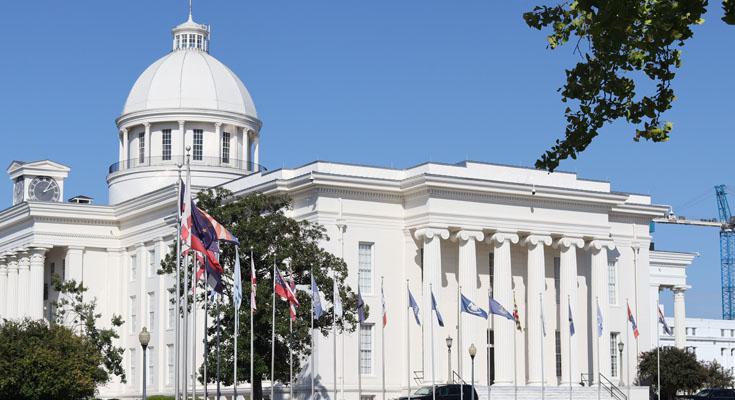By Brandon Moseley
Today is the State of Alabama’s birthday. More specifically, Alabama became a state on Dec. 14, 1819. The State of Alabama has been a state for 202 years today. Alabama has a tremendous amount of history and much of that history is documented in museums across the state. Learning about the history of Alabama and its people is an activity that the whole family can enjoy.
The story of Alabama is actually much older than 202 years and goes back millennia to the indigenous people who lived here prior to the voyages of Christopher Columbus and the discovery of the Americas by Europeans.
Just south of Tuscaloosa is Moundville Archeological Park. It tells the story of the people of the Mississippi mound-building culture that farmed, raised turkeys, hunted and fished in the state for centuries prior to contact with Europeans. The Creeks, Choctaws, Cherokees, and Chickasaws are descendants of that older culture.
The first Europeans to attempt to settle Alabama were the Spanish who discovered Mobile Bay. They built a fort; but their efforts were thwarted by two hurricanes. The French founded Mobile in 1702. The French expanded their presence in Alabama over the next decades and Fort Toulouse to the Northwest of Montgomery remembers that effort. The French would lose the French and Indian War to the English who would occupy Mobile. The Spanish entered the American Revolution on the side of the Americans and they attacked Mobile and took it from the English. You can learn about Mobile’s history at the Mobile Historical Museum.
Following the Revolution, many American pioneers moved into the state from Tennessee and Georgia. This led to conflict with the Native Americans. A faction of Creeks known as the Red Sticks wanted war. They attacked and massacred American settlers at Fort Mims north of Mobile. That site is maintained by the Alabama historical commission. The U.S. Army was tied up in the north during the War of 1812 so southern states mobilized their militias under Major Gen. Andrew Jackson who came to Alabama to fight the Creeks. Eventually, Jackson defeated the Red Stick Creeks at Horseshoe Bend. The Horseshoe Bend National Military Park north of Dadeville is on that site today.
Tannehill State Park, southwest of Birmingham, tells the story of the hardy pioneers and the beginnings of the iron and steel industry with the Tannehill Ironworks.
The Southern States seceded from the Union in 1861, forming the Confederacy. Montgomery was the first Capital of the Confederacy. The historic Alabama Capital Building and the First White House of the Confederacy are sites where one can experience that history. The adjacent Alabama Archives Building tells the whole story of the state of Alabama. The Civil War Veterans Museum site outside Clanton has more Civil War information including about how the state of Alabama cared for its Civil War veterans in their old age.
There are a number of Antebellum homes operated as Museums across Alabama including the Belle Mont Mansion in Tuscumbia, the Oakleigh Mansion in Mobile, the Gaineswood Plantation House in Demopolis, Arlington in Birmingham, and more.
The military became a major part of Alabama’s history as the nation fought two World Wars in the first half of the twentieth century followed by the Cold War, Korea, and Vietnam. The state has Battleship Park in Mobile that tells that history. There one can tour the U.S.S. Alabama, an authentic World War II battleship as well as the U.S.S. Drum – a submarine. The museum also has tanks and aircraft from World War II and beyond. The Southern Museum of Flight in Birmingham houses numerous aircraft that one can see as well as exhibits about the history of aviation in Birmingham.
Slavery and segregation are an unfortunate part of Alabama’s past. Montgomery has the National Memorial to Peace and Justice and it remembers all the African-Americans who were killed by lynch mobs in the South’s sometimes sordid history.
Alabama is also the home of the Civil Rights Movement. Montgomery has the Rosa Parks Museum, about the Montgomery Bus Boycott, as well as the Dexter Avenue Baptist Church where Rev. Martin Luther King Jr. preached. Birmingham has the Civil Rights Museum which is across the street from the historic Sixteenth Street Baptist Church. Selma is another must see destination for Civil Rights Movement tourists.
Leeds has the Barber Motorsports track with a museum devoted to motorcycles and auto racing. There is also an automobile racing museum at the Talladega Superspeedway.
Huntsville is the home of the Space and Rocket Center that tells the story of America’s (and Alabama’s) space exploration.
There are dozens of other historical sites and museums that one can visit while celebrating Alabama’s heritage.










